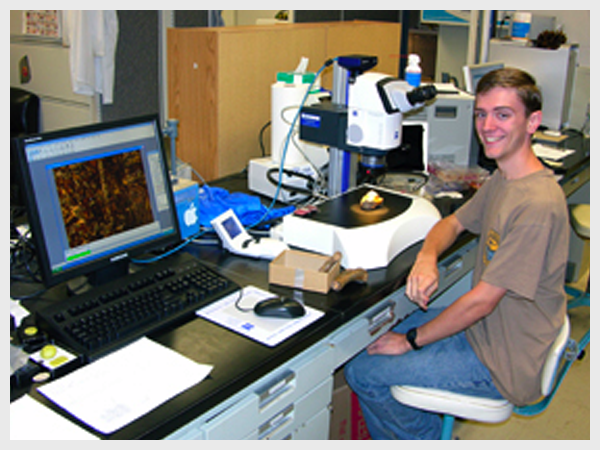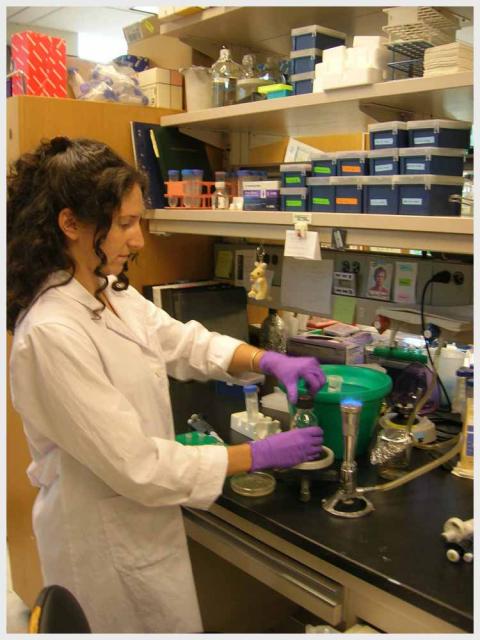To start an application, click here.
Download full list of Degree Requirements here.

Formal Course Requirements
In addition to the minimum requirements of the Graduate School, the following courses are required for all students in the program:
- Regional Anatomy for Graduate Students HBA 560 (5 credits, Fall)
- A statistics course approved by the advisor or department.
- Integrity in Science GRD 500 (1 credit, spring), required by the Graduate School
- Practicum in Teaching (HBA 695, 1-4 credits)
In addition, each student is required to take three elective courses, chosen in consultation with his/her advisor. These are typically selected from among those given by the Department of Anatomical Sciences or other departments at Stony Brook University. However, with approval of the student’s advisor and the Graduate Program Director, elective courses may also be taken at other institutions. Click here to see a what a typical schedule might look like.
Example electives include:
Anatomy Department Electives
- Primate Evolution HBA 564 (4 credits, spring, even years)
- Human Evolution HBA 565 (4 credits, fall, even years)
- Vertebrate Evolution HBA 550 (4 credits, spring, odd years)
- Phylogenetic Systematics HBA 551, (4 credits, spring, even years)
Example Non-Anatomy Department Electives:
- Principles of Evolution BEE 551 (4 credits, fall)
- Macroevolution BEE 561 (3 credits, spring, odd years)
- Geometric Morphometrics BEE 564 (3 credits, fall, even years)
- Paleobiology BEE 583 (3 credits, spring)
- Molecular Evolution BEE 565 (3 credits, spring, odd years)
- Multivariate Analysis in Biology BEE 553 (3 credits, fall)
- Graduate Genetics BGE 510 (3 credits, spring)
- Principles of Development MCB 657 (3 credits, fall)
- Bayesian Data Analysis and Computation BEE 569 (4 credits, fall)
- Advanced Biostatistics and Phylogenetic Comparative Methods DPA 536 (3 credits, spring)
Depending on a student’s area of specialization, he/she may be required to take additional courses, to be determined in consultation with his/her advisor. A student must achieve a grade of B or higher in each of the required courses, and must maintain a B average or higher in all elective courses. (Note, as stated above, three electives are a required component of the Ph.D. program.) Failure to maintain these grade averages may adversely affect a student’s funding. Students must enroll for 9 credits per semester for each of their five years in the program. The Graduate School assigns entering students with no master’s degree "G3" status. Subsequent to the completion of 18 graduate credits (i.e., at the end of Year 1), students are assigned "G4" status. Students who enter the program with a master’s degree are typically assigned G4 status. At the end of the first semester, the student must meet with his/her advisor and two other university faculty members, one of whom must also be another member of the Department of Anatomical Sciences, to form a plan for his/her preliminary examination (taken during Year 2; see below). By the end of Year 1, the student should select, in consultation with this committee, two elective subjects for the Year 2 preliminary examination.
Extramural Funding
Students are expected to apply for relevant extramural research support throughout their graduate career. In particular, all eligible students must apply for the following funding opportunities: 1) the American Association for Anatomy’s Predoctoral Fellowship; and 2) the National Science Foundation’s Graduate Research Fellowship Program.
Preliminary Examination
 All students are required to take an oral preliminary examination upon completion of formal courses by the end of their fourth semester. This exam will be administered by three faculty members, at least two of whom are members of the Department of Anatomical Sciences. All students will be examined in human gross anatomy. The second and third subjects will depend on the student's planned area of specialization as determined in Year 1, such as musculoskeletal biology, functional morphology, paleontology, systematics, or vertebrate evolution.
All students are required to take an oral preliminary examination upon completion of formal courses by the end of their fourth semester. This exam will be administered by three faculty members, at least two of whom are members of the Department of Anatomical Sciences. All students will be examined in human gross anatomy. The second and third subjects will depend on the student's planned area of specialization as determined in Year 1, such as musculoskeletal biology, functional morphology, paleontology, systematics, or vertebrate evolution.
Advancement to Candidacy
The faculty will recommend a student to the Graduate School for advancement to candidacy when they pass their oral preliminary examination (which means the student has also satisfactorily completed all required coursework). The student then advances to candidacy for the Ph.D. and has "G5" status with the Graduate School.
Dissertation Proposal Examination
Following advancement to candidacy a student must select a dissertation committee that must include, but is not limited to, four individuals meeting the following description: two members of the Department of Anatomical Sciences (one of whom is the student’s advisor), one person from outside the department (either at Stony Brook University or another institution), and one member who may either be internal or external to the department. Any member outside the department must be selected in consultation with the student's primary advisor. Students must formally present a list of his/her committee members to the Graduate Program Director, preferably by the end of the third semester. In consultation with this committee the student prepares a dissertation proposal. The dissertation proposal defense consists of an oral presentation of this proposal to the department as a whole, followed by an oral defense before the dissertation committee. The student must make the proposal available to the committee at least three weeks prior to the defense and to the faculty at large (by depositing it with the Graduate Program Coordinator), two weeks prior to the defense. This defense must occur no later than 12 months after passing the oral preliminary examination. Change to this deadline requires a formal petition to the faculty and is only granted under extenuating circumstances. Students also prepare a written proposal reviewed by their committee. This document typically becomes the core of a grant proposal for extramural research funding.
Dissertation Research
Each student completes his/her dissertation research in Years 4 and 5 under the supervision of his/her dissertation committee, and performs the research leading to the preparation of a written dissertation. The dissertation must contain the results of an original and significant investigation.
Dissertation Defense
Following completion of the dissertation, and with the approval of the dissertation committee, a student must present his/her findings in a formal public oral defense. The student must make the written dissertation available to the dissertation committee at least three weeks prior to the defense and to the faculty at large (by transmitting it to the Graduate Program Coordinator), two weeks prior to the defense. The defense is not chaired by the student's advisor, but rather by another member of the dissertation committee. Following the oral presentation of results and questioning by the audience, the student defends his/her results before the dissertation committee.
Teaching Requirement
Every student is required to teach medical human gross anatomy (HBA 560) at least once before graduation. A student must sign up for the teaching practicum (HBA 695) in conjunction with this teaching. Teaching dental or allied health gross anatomy is not considered fulfillment of this requirement. In addition, students receiving departmental financial support are typically required to teach in one of the department’s anatomy courses, and may be asked to fulfill other departmental research tasks. Teaching medical gross anatomy is an important part of a student’s learning and training experience, and strengthens a student’s future job prospects.
Meeting Deadlines
We strongly encourage all students to do everything they can to meet deadlines. Deadline extensions may be granted, but only under extraordinary circumstances. Be advised that missing deadlines (e.g., oral examination, dissertation proposal defense) can adversely affect funding.
Funding
Funding is dependent on a number of contingencies, including maintaining a B average GPA in all electives, receiving a B or better in all required courses, meeting all required deadlines, and the financial status of the department. The department's financial standing and the progress of all students requesting funding will be reviewed on a yearly basis. Students in good standing enrolled in graduate school at Stony Brook in their 1st through 5th years will remain in contention for funding. Students should not expect funding beyond Year 5. Students are expected to seek and obtain external funding for their graduate research. Such funding should be viewed as adding to the reputation of the student and the department, but it will not affect a student's entitlement to support beyond their 5th year. Students receiving departmental funding are typically required to work for the department (approximately 15 hours per week) either as teachers or research assistants.
Student Progress Reports
Every student's progress in the department will be reviewed twice a year. The Graduate Program Director will prepare a report in consultation with the student's advisor and the faculty as a whole, granting the student a grade of either "satisfactory" or "unsatisfactory."
First Year Students
All graduate students who are U.S. citizens must file for New York State residency in their first year on campus. Becoming a New York resident substantially lowers a student’s tuition costs. All first- and second-year students are strongly encouraged to write and submit a grant application for an NSF Graduate Research Fellowship. These prestigious fellowships provide a student with three years of funding and some research money. Applying for an NSF Graduate Research Fellowship also provides an excellent opportunity to begin learning the skill of grant writing. Faculty advising first- and second-year students will provide mentorship on this topic.
Health Insurance
Because students may be funded from different sources, it is important that they remain in close communication with the Graduate Program Coordinator in case a shift in funding also means a shift in health insurance programs. If a student’s funding switches from one type to another, the student must make sure that correct applications are made for continued health insurance coverage.
Registration
All PhD students must register for at least 9 credits per semester to qualify as full-time. A student must also register for 9 credits in the semester in which he/she plans to graduate (i.e., a student must have full-time status to graduate). If a student is supported by a stipend during the summer, he/she must register for 0 credits during the summer.
Graduation
There is a modest amount of administrative work (online and hard copy forms) must be filed before a student can graduate. Doctoral defense forms can be completed online at the SBU Graduate School’s website. It is the student’s responsibility to work closely with the Graduate Program Coordinator to ensure all necessary paperwork is completed and filed in a timely manner.
Research Money
Occasionally the department can make research funds available to students, typically for travel to scientific meetings where the student is presenting a talk or poster. The Graduate Program Director will notify the students as these opportunities arise. This funding is not automatic but is approved either by the Graduate Program Director or the Department.
Travel related to the PhD
Stony Brook University requires graduate students to have university approval to conduct research travel, including travel for meetings, collections research and fieldwork. Students planning any travel, particularly international travel, should consult with the Graduate Program Director. Travel to any international destination as part of work related to the Ph.D. or Stony Brook University business requires registration with the university.

